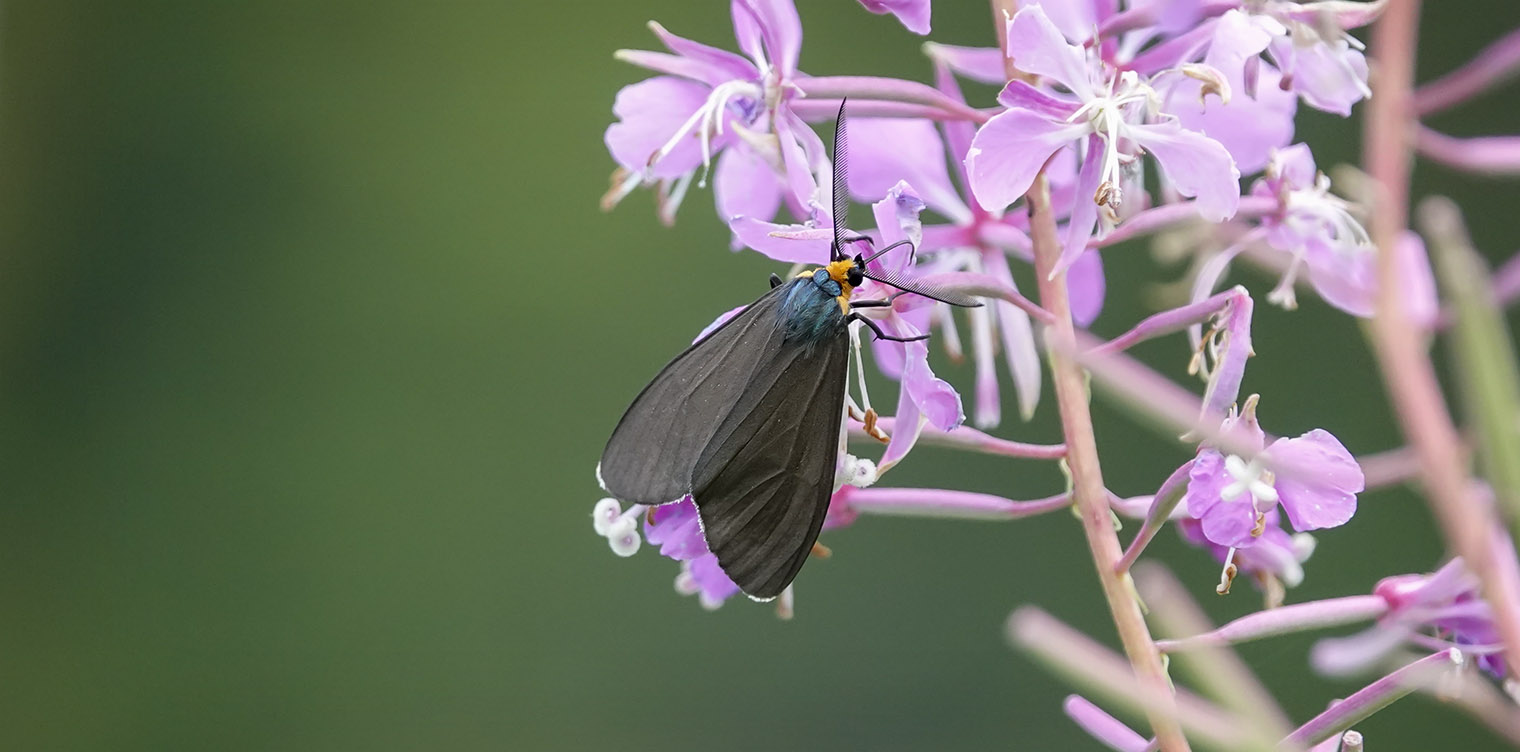Butterflies & Moths of the Adirondacks:
Virginia Ctenucha (Ctenucha virginica)

The Virginia Ctenucha (Ctenucha virginica) is an attractive moth that flies in the Adirondack Mountains of upstate New York in mid-summer. It is widespread and common. [1] The Virginia Ctenucha is a member of the Erebidae family. [2] This family consists of a varied group of striking moths living in woodlands, fields, and gardens,[3] as well as freshwater swamps, marshes, and bogs. [4]
Virginia Ctenucha: Identification
The Virginia Ctenucha is the largest and most broad-winged of wasp moths in North America. [5] Its wingspan is 1 3/8 to 2". [6] This moth has a metallic blue body, which contrasts with the bright orange of its head and the sides of its collar. [7] Its fore wing is a deep grayish brown, with some metallic blue at base. Its hind-wing is black. As can be seen from the photo, the fringes on all the wings are partly white. [8]
Virginia Ctenucha: Life History
The adult Virginia Ctenucha flies primarily during the day, but may also come to light at night. [9] Adults feed on nectar at various flowers, such as goldenrod. [10] The larva body surface is black, covered with tufts of cream-colored or black hairs. [11] Caterpillar hosts include grasses, sedges, and irises. [12]
Virginia Ctenucha: Habitat and Range
The Virginia Ctenucha lives in woodlands, fields, gardens, and wetlands in northeastern North America. Despite its name, this is a northern moth. [13] Its range includes much of northeastern North America, from Labrador to Pennsylvania, west to Manitoba and Kansas. [14] The flight period for the Virginia Ctenucha throughout its range is from late spring to late summer. [15] [16] [17] The larva can usually be seen from April to September, but may be found any time of year, since they overwinter. [18]
Virginia Ctenucha: Flight
The flight period for this moth in the Adirondack Park has not been documented. However, sighting records suggest that it flies mainly in July.
- In 2012, Virginia Ctenucha moths were observed near Tupper Lake in Franklin County in early July 2012 and in Essex County in late July 2012. [19] This moth was present in the Paul Smiths VIC Native Species Butterfly House fairly consistently from 21 June through 27 July. [20] In 2013, this moth was present in the Butterfly House in late July. [21] In 2014, the Virginia Ctenucha was present in the Butterfly House in mid-July. [22]
- The pattern of iNaturalist observations of this moth from 2020 to 2024 suggest a flight period from late June to late July in the Adirondack Park, with most sightings in July. [23]
References
- Susan Grimm Hanley. Interpretive Naturalist, Paul Smith's College Native Species Butterfly House. Species Logbooks.
- Butterflies and Moths of North American. Species Profiles. Sighting records: 7/4/2012; 7/27/2012; 7/18/2013; 7/22/2013; 7/19/2014; 7/19/2014; 7/24/2014. Retrieved 14 January 2025.
- iNaturalist. Adirondack Park Observations. Virginia Ctenucha Moth. Ctenucha virginica. Retrieved 14 January 2025.
- Iowa State University. Department of Entomology. BugGuide. Retrieved 14 January 2025.
- Insect Images. Virginia Ctenucha. Retrieved 14 January 2025.
- Discover Life. Virginia Ctenucha. Retrieved 14 January 2025.
- Mississippi State University. Mississippi Entomological Museum. North American Photographers Group. Ctenucha virginica. Retrieved 14 January 2025.
- University of Alberta. Department of Biological Sciences. E.H. Strickland Entomological Museum. Ctenucha virginica. Retrieved 14 January 2025.
- Charles V. Covell, Jr. A Field Guide to the Moths of Eastern North America (Houghton Mifflin Company, 1984), p. 75, Plate 12. Retrieved 14 January 2025.
- David Beadle and Seabrooke Leckie. Peterson Field Guide to Moths of Northeastern North America (Houghton Mifflin Harcourt Publishing Company, 2012), pp. 308-309.
